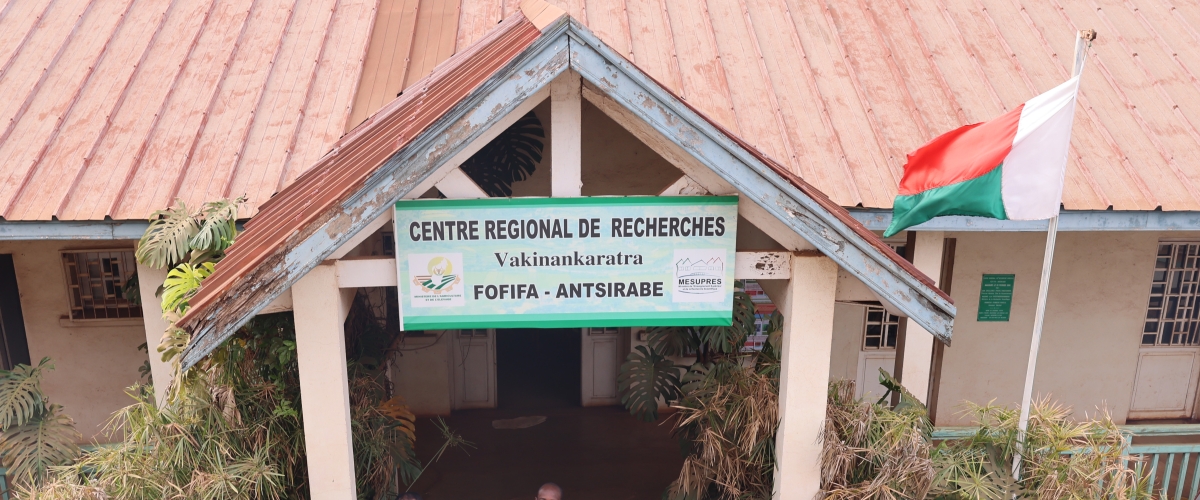
The Centre for Coordination of Agricultural Research and Development for Southern Africa (CCARDESA) undertook the first technical mission under the Food Systems Resilience Programme (FSRP) in the Republic of Madagascar, from the 31st of July to the 4th of August 2023. The mission began with courtesy meetings with The Honourable Harifidy Janset Alin RAMILISON, the Minister for Agriculture and Livestock in the Republic of Madagascar who welcomed the delegation together with the Permanent Secretary of the Ministry, Madame Fanja RAHARINOMENA. The CCARDESA team also had an opportunity to meet and discuss the project with Prof Lala RAZAFINJARA, the Director General of the Centre National de Recherche Appliquée au Development Rural (FOFIFA). Prof RAZAFINJARA is also the current Chairperson of the CCARDESA Board of Directors.
The mission began with a courtesy meeting with The Honourable Harifidy RAMILISON, the Minister of Agriculture and Livestock.
Minister RAMILISON stressed that FSRP has an important role to play for the country as food resilience is a topical issue in Madagascar. This follows the malnutrition and chronic food insecurity levels that have been reported over the years in Madagascar and the recurrent drought spells that have been experienced, particularly in the country’s southern part. The Minister’s sentiments were echoed by Prof RAZAFINJARA who emphasized that under FSRP, Madagascar has no room for failure since the project is expected to change the current picture.
FSRP is a multi-phase six-year World Bank funded initiative in which Madagascar is the only SADC Member State in the first phase of implementation. Other countries that have recently joined in subsequent phases are Malawi, Comoros, and Tanzania. Regionally overseen by CCARDESA, FSRP is aimed at increasing the resilience of food systems and preparedness against food insecurity in the participating countries.
In Antananarivo, the FSRP Project Implementation Units (PIUs) from Madagascar and CCARDESA, including key project stakeholders in the island country (e.g., Africa Rice and International Institute for Tropical Agriculture - IITA), convened to exchange experiences and discuss planned activities. Discussions also touched on project result frameworks, the role of CCARDESA and potential areas of collaboration. Among others, the requirements for establishing a Regional Centre of Leadership (RCoL) were extensively discussed as Madagascar was eager to learn from CCARDESA’s experience in working with countries that have benefitted from the same initiative under the Agricultural Productivity Programme for Southern Africa (APPSA), another World Bank funded initiative coordinated by CCARDESA. These are: Maize RCoL (Malawi), Rice RCoL (Mozambique), Legumes RCoL (Zambia) and two others that are currently under establishment – Cassava RCoL (Angola) and Horticulture RCoL (Lesotho).
The CCARDESA technical mission was also taken to Antsirabe in the Vakinankaratra and Itasy regions to learn from the work undertaken by key FSRP partners on the ground. In Antsirabe, delegates visited the research station and a dairy farm operated by FIFAMANOR (Fiompiana Fambolena Malagasy Norveziana), a Malagasy agricultural research and outreach organization also implementing some FSRP activities. Delegates also visited CFFAMMA (Centre de Fabrication, de Formation et d'Application du Machinisme et de la Mécanisation Agricole), a public organization specializing in mechanization to support farmers across the country with customized manual and motorized agricultural implements. Still in Antsirabe, delegates visited the FOFIFA regional office to appreciate on-going research activities related to crop management and pest and disease control. In Itasy region, delegates visited farmers growing sorghum and beans for their livelihoods who are earmarked to benefit from FSRP. The mission concluded with agreed actions to be undertaken by both parties before end of the current year.
The courtesy meeting was also an opportunity to share CCARDESA's knowledge products with the Minister of Agriculture and Livestock





